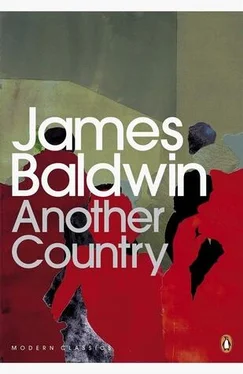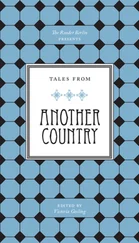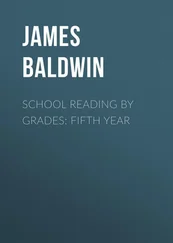James Baldwin - Another Country
Здесь есть возможность читать онлайн «James Baldwin - Another Country» весь текст электронной книги совершенно бесплатно (целиком полную версию без сокращений). В некоторых случаях можно слушать аудио, скачать через торрент в формате fb2 и присутствует краткое содержание. Год выпуска: 2001, Издательство: Penguin Books, Жанр: Современная проза, на английском языке. Описание произведения, (предисловие) а так же отзывы посетителей доступны на портале библиотеки ЛибКат.
- Название:Another Country
- Автор:
- Издательство:Penguin Books
- Жанр:
- Год:2001
- ISBN:нет данных
- Рейтинг книги:3 / 5. Голосов: 1
-
Избранное:Добавить в избранное
- Отзывы:
-
Ваша оценка:
- 60
- 1
- 2
- 3
- 4
- 5
Another Country: краткое содержание, описание и аннотация
Предлагаем к чтению аннотацию, описание, краткое содержание или предисловие (зависит от того, что написал сам автор книги «Another Country»). Если вы не нашли необходимую информацию о книге — напишите в комментариях, мы постараемся отыскать её.
is a novel of passions — sexual, racial, political, artistic — that is stunning for its emotional intensity and haunting sensuality, depicting men and women, blacks and whites, stripped of their masks of gender and race by love and hatred at the most elemental and sublime. In a small set of friends, Baldwin imbues the best and worst intentions of liberal America in the early 1970s.
Another Country — читать онлайн бесплатно полную книгу (весь текст) целиком
Ниже представлен текст книги, разбитый по страницам. Система сохранения места последней прочитанной страницы, позволяет с удобством читать онлайн бесплатно книгу «Another Country», без необходимости каждый раз заново искать на чём Вы остановились. Поставьте закладку, и сможете в любой момент перейти на страницу, на которой закончили чтение.
Интервал:
Закладка:
Eric blushed, and humorously pursued his lips. “I’d enjoy it a whole lot more if you’d put your rivers and bridges in the middle of the city instead of having them all pushed off on the edges this way. You can’t breathe in this city in the summertime; it’s frightening.” He looked at Vivaldo. “I don’t know how you barbarians stand it.”
“If it wasn’t for us barbarians,” said Vivaldo, “you mandarins would be in one hell of a fix.” He kissed Cass on the forehead, and struck Eric lightly on the back of the neck. “It’s good to see you, anyway.”
“We’ve got good news,” said Cass, “though I guess I really ought to let Eric tell it.”
“Well, we’re not absolutely certain that it’s good news,” said Eric. He looked at Ida and Vivaldo. “Anyway, I think we ought to keep them in suspense for awhile. If they don’t think I’m the greatest thing they ever saw in this movie, why, then, I think we just ought to let them find out what’s happening when the general public finds out.” And he threw his chin in the air and swaggered toward the box office.
“Oh, Eric,” cried Cass, “ can’t I tell them?” She said, to Ida and Vivaldo, “It’s got something to do with this movie we’re going to see.”
“Well, you’ve got to tell us,” Ida said, “or we simply won’t go in.” She raised her voice in the direction of Eric’s back: “We do know other actors.”
“Come on, Cass,” said Vivaldo, “you’ve got to tell us now.”
But Cass looked again in Eric’s direction, with a small, frowning smile. “ Let me tell them, sweetheart.”
He turned, smiling, with the tickets in his hand. “I don’t know how to stop you,” he said. He moved over to Cass, and put one arm around her shoulder.
“Well,” said Cass, smaller than ever, and more radiant — and, as she spoke, Eric watched her with an amused and loving smile—“Eric doesn’t have much of a part in this movie, he only appears in one or two scenes and he’s only got a couple of lines—”
“ Three scenes,” said Eric, “ one line. If one of you sneezes, you die.”
“—but on the strength of this —” cried Cass.
“Well, not only on the strength of this,” said Eric. “Will you let the girl talk?” asked Vivaldo. “Go on, Cass.”
“—on the strength of this particular performance”—
“—exposure,” said Eric.
“Oh, shit,” cried Vivaldo.
“He’s a perfectionist.” Cass said.
“He’s going to be a dead one, too,” said Ida, “If he doesn’t stop hogging this scene. Lord, would I hate to work with you. Please go on, Cass.”
“Well, telegrams and phone calls have been coming out of Hollywood asking Eric if he will play—” and she looked up at Eric.
“Well, don’t stop now,” cried Ida.
Eric, now, was very pale. “They’ve got some wild idea out there of making a movie version of The Possessed —”
“The Dostoievski novel,” said Cass.
“Thanks,” said Vivaldo, “and—?”
“They want me to play Stavrogin,” said Eric.
A total silence fell, and they all stared at Eric, who looked uneasily back at them. There gleamed a small crown of sweat on his forehead, just below the hairline. Vivaldo felt a mighty tug of jealousy and fear. “Wow!” he said. Eric looked at him, seeming to see into his heart; and his brow puckered slightly, as though he were stiffening himself for a quarrel.
“It’s probably going to be an awful movie,” he said, “can you imagine them doing The Possessed? I didn’t really take it seriously until my agent called me. And then Bronson called me, too, because, you see, there’s going to be a kind of conflict with Happy Hunting Ground . Were set to go into rehearsal next month, and, who knows? maybe it’ll be a hit. So we’ve got to iron that out.”
“But they’re willing to do almost anything to get Eric,” Cass said.
“That’s not entirely true,” said Eric, “don’t listen to her. They’re just very interested, that’s all. I don’t believe anything until it happens.” He took a blue handkerchief out of his back pocket and wiped his face. “Let’s go in,” he said.
“Baby,” said Vivaldo, “you’re going to be a star.” He kissed Eric on the forehead. “You son of a bitch.”
“Nothing is set,” said Eric, and he looked at Cass. He grinned. “I’m really part of an economy drive. They can get me cheap, you know, and they’ve got almost everybody you ever heard of lined up for the other roles — so my agent explained to me that my name goes below the title—”
“ But in equal size,” said Cass.
One of those and introducing deals,” said Eric, and laughed. He looked pleased about his good news for the first time.
“Well, baby, it looks like you’ve made it now,” said Ida. “Congratulations.”
“Your clairvoyant Frenchman,” Cass said, “was right.”
“Only what are they going to do about that ante-bellum accent?” asked Vivaldo.
“Look,” said Eric, “let’s go see this movie. I speak French in it.” He threw an arm around Vivaldo’s shoulder. “Impeccably.”
“Hell,” Vivaldo said, “I don’t really feel like seeing a movie. I’d much rather take you out and get you stinking drunk.”
“You’re going to,” said Eric, “as soon as the movie’s over.”
And they came, laughing, through the doors just as the French film began. The titles were superimposed over a montage of shots of Paris in the morning: laborers on their bicycles, on their way to work, coming down from the hills of Montmartre, crossing the Place de la Concorde, rolling through the great square before Notre Dame. In great close-ups, the traffic lights flashed on and off, the white batons of the traffic policemen rose and fell; it soon became apparent that one had already picked up the central character and would follow him to his destination; which, if one could judge from the music would be a place of execution. The film was one of those politics, sex, and vengeance dramas the French love to turn out, and it starred one of the great French actors, who had died when this film was completed. So the film, which was not remarkable in itself, held this undeniable necrophilic fascination. Working with this actor, being on the set while this man worked, had been one of the great adventures of Eric’s life. And though Cass, Vivaldo, and Ida were interested in the film principally because Eric appeared in it, the attention which they brought to it was dictated by the silent intensity of Eric’s adoration. They had all heard of the great actor, and they all admired him. But they could not see, of course, as Eric could, with what economy of means he managed great effects and turned an indifferent role into a striking creation.
On the other hand, just as the politics of the film were made helplessly frivolous by the French passion for argument and distrust of community, so was the male star’s overwhelming performance rendered suspect by the question of just why so much energy and talent had been expended on so little.
Ida grabbed Vivaldo’s hand in the darkness, and clung to it as though she were a child, mutely begging for reassurance and forgiveness. He pressed his shoulder very close to hers, and they leaned against one another. The film unrolled. Cass whispered to Eric, Eric whispered to Cass. Cass turned toward them, whispering, “Here he comes!” and the camera trucked into a crowded café, resting finally on a group of students. “That’s our boy!” cried Ida, disturbing the people around them — who sounded, for a second, like the weirdest cloud of insects. Cass leaned over and kissed Eric on the nose; and, “You look very good,” Vivaldo whispered. Eric was compelled to be still during this entire brief scene, while the students around him wrangled: his head was thrown back and up, against the wall, his eyes were closed; and he seemed scarcely to move at all. Yet, the director had so placed him that his drunken somnolence held the scene together, and emphasized the futility of the passionate talkers. Someone jostled the table and Eric’s position shifted slightly. He seemed to be made of rubber, and seemed, indeed, to be fleeing from the controversy which raged around him — in which, nevertheless, he was fatally involved. Vivaldo had been with Eric when he was drunk and knew that this was not at all the way Eric behaved — on the contrary, it was the Southern rebel and a certain steel-rod quality which came out in Eric then; and Vivaldo, at the same time that he realized that Eric was doing a great deal by doing very little, also, for the first time, caught a glimpse of who Eric really was. It was very strange — to see more of Eric when he was acting than when he was being, as the saying goes, himself. The camera moved very little during this scene and Eric was always kept in range. The light in which he was trapped did not alter, and his face, therefore, was exposed as it never was in life. And the director had surely placed Eric where he had because this face operated, in effect, as a footnote to the twentieth-century torment. Under the merciless light, the lined, tense, coarse-grained forehead also suggested the patient skull; an effect which was underlined by the promontory of the eyebrows and the secret place of the eyes. The nose was flaring and slightly pug, more bone, nevertheless, than flesh. And the full, slightly parted lips were lonely and defenseless, barely protected by the stubborn chin. It was the face of a man, of a tormented man. Yet, in precisely the way that great music depends, ultimately, on great silence, this masculinity was defined, and made powerful, by something which was not masculine. But it was not feminine, either, and something in Vivaldo resisted the word androgynous . It was a quality to which great numbers of people would respond without knowing to what it was they were responding. There was great force in the face, and great gentleness. But, as most women are not gentle, nor most men strong, it was a face which suggested, resonantly, in the depths, the truth about our natures.
Читать дальшеИнтервал:
Закладка:
Похожие книги на «Another Country»
Представляем Вашему вниманию похожие книги на «Another Country» списком для выбора. Мы отобрали схожую по названию и смыслу литературу в надежде предоставить читателям больше вариантов отыскать новые, интересные, ещё непрочитанные произведения.
Обсуждение, отзывы о книге «Another Country» и просто собственные мнения читателей. Оставьте ваши комментарии, напишите, что Вы думаете о произведении, его смысле или главных героях. Укажите что конкретно понравилось, а что нет, и почему Вы так считаете.












